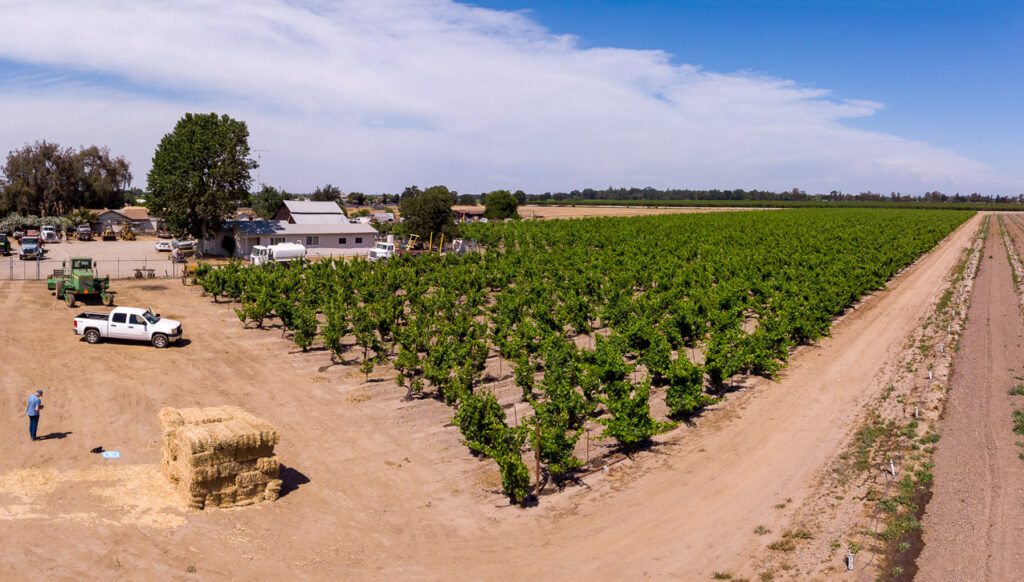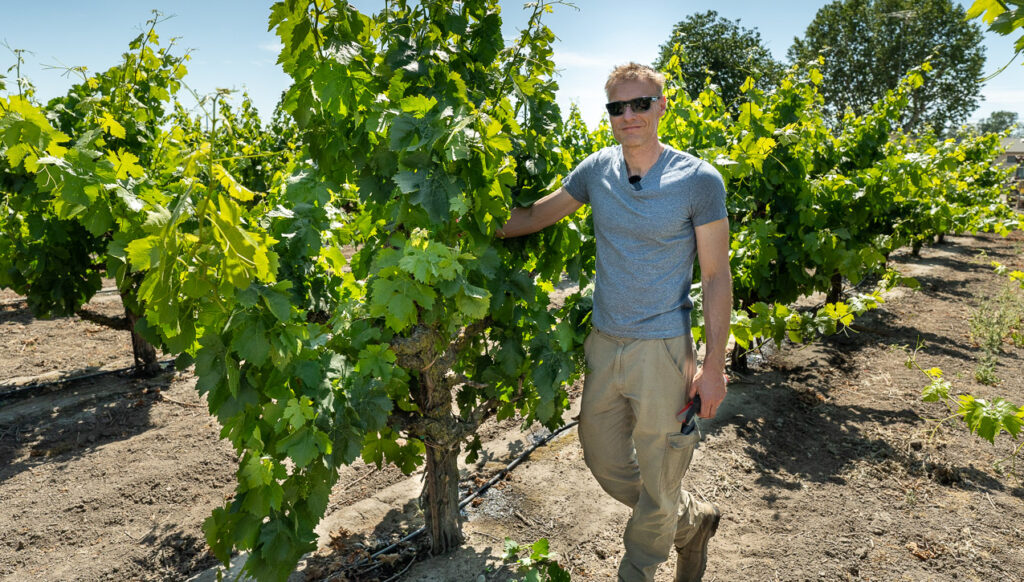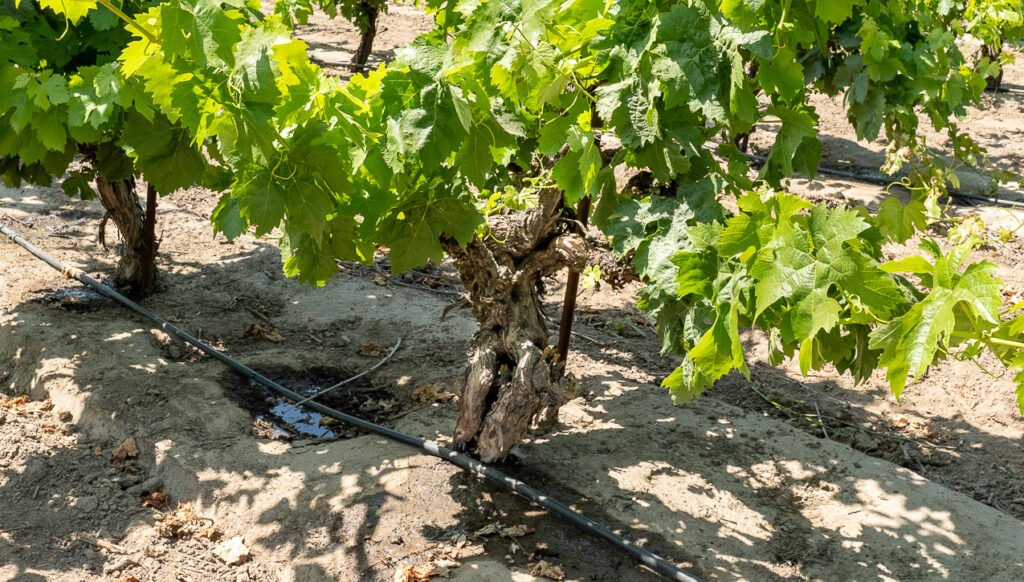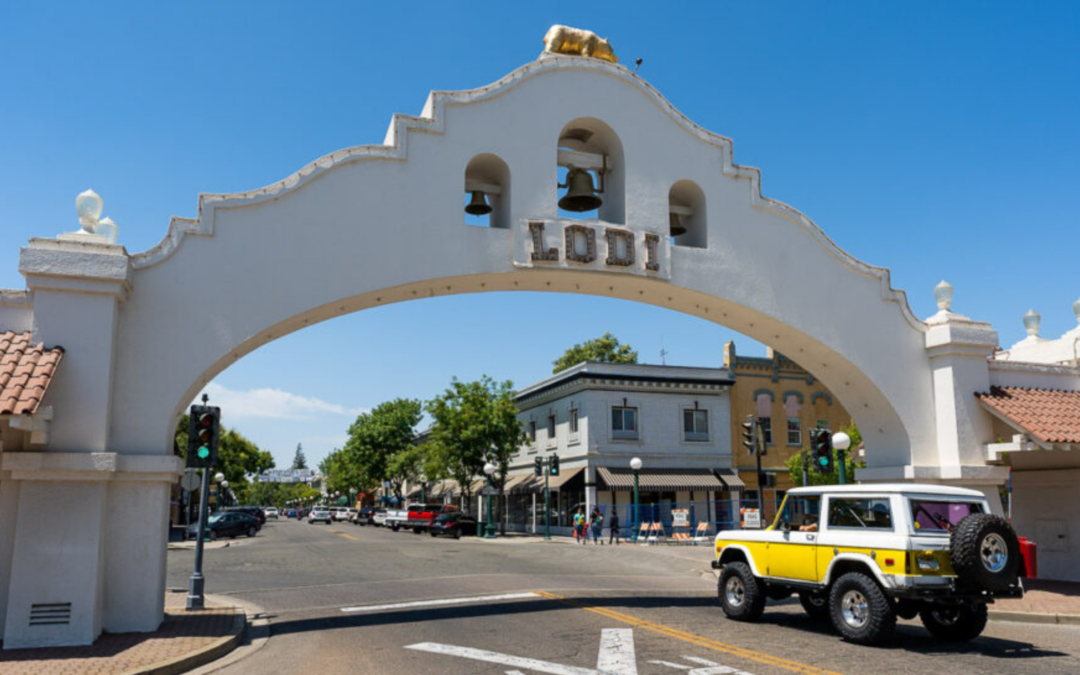DECEMBER 13, 2021. BY JEFF BURROWS, FOOD WINE CLICK!
This article was originally submitted as an entry in the Jancis Robinson annual wine writing competition and was posted here with written permission from the author. All views belong to the author.
Old vines survive more by luck or accident than intent in Lodi, California. Fortunately, there are vinegrowers who recognize their value and are doing something about it. Old vines can produce what young vines cannot: wines with more depth, concentration, complexity. This only happens if they are farmed for quality and not for volume. One vineyard, 80+ year-old Nicolini Ranch, is being transformed in a move to high quality production.
There are several risks to vines in this part of California’s Central Valley where high-volume crops are king. First, there’s the economics of commodity grapes. Lodi’s vineyards are tended by farmers who manage their fields strictly as a business. Their crops must generate a profit for the farm, with grapes being just one among many choices. Lodi grapes are typically sold in bulk via contract to the big corporate wineries such as Gallo, Constellation Brands, or Treasury Wine Estates. Vines are managed to maximize volume with typical yields of 10-15 tons per acre (more than 140 hl/ha).
Second, grape prices vary with demand and supply. Once the per ton price is no longer acceptable, vines will be torn out to make way for a new crop of whatever appears to be more profitable. Olives and nuts have been popular recently. Of course, other growers are doing the same thing, so prices for the new crops drop from harvest to harvest. Just a few years ago, walnuts and almonds fetched up to $4.00 per pound. Today they routinely sell for $0.50 up to $1.00 for organic. Nuts require four times as much water as grapes. The current drought in California will likely result in many nut trees being pulled out, with a more drought-tolerant crop going in, repeating the cycle.
Third, old vines are at risk any time a property changes hands – the death of an owner, the generational change from parent to offspring, and of course, the sale of the property. The Nicolini Ranch was facing this fate. Originally built in 1921, the ranch was under stable family ownership for many years until old owners passed. Then the property changed hands in 1992, 2004, and 2019.

Nicolini Ranch.
The Nicolini Ranch is a 9.7-acre plot in the Mokelumne River AVA within the larger Lodi AVA. Driving past on Ham Lane, the property wouldn’t suggest something old and valuable is planted there. The Carignan vines had been planted sometime in 1930-36, and a winery permit had been applied for in 1940. In 2019, the old vines were still producing a profitable yield and earning their ability to remain. However, the vineyard was rundown and mistakes in vineyard tasks by a new team resulted in a vintage where no grapes could be harvested. Understandably, the new owner was trying to decide what to do next.
Nicolini Ranch’s new owner approached Markus Niggli early in 2021. Markus is known among Lodi growers for his passion for high quality grapes. In addition to managing multiple vineyards and operating his winery, he runs a successful business shipping high quality Lodi grapes to wineries in other parts of the US. The new owner was looking for someone who could teach him what to do with these vines. The new owner was hoping to secure future sales as well. Markus stated his conditions: “I really care about this vineyard. It’s a privilege to be able to work with grapes this age, to give them some grace and elegance.” He continued “I’ll guide you through the year and tell you what to do, but you have to listen.” As for his promise to sell the new owner’s grapes, Markus stated, “I’ll use or sell as much as I can to other growers, other wineries, just to showcase what this region can do.”

Markus Niggli at Nicolini Ranch.
In the vineyard, Markus’ passion for these old vines is evident. For years, the vines had been incorrectly pruned. They stood like trees, 8-10 ft tall with so much growth, the canopy hid everything. He showed the owner’s crew the process of shifting the vines to high quality production. Instead of 70 clusters per vine, they prune to 15, dropping the yield but increasing concentration. The vineyard rows are oriented east-west. The vines are worked from the north side, as the south side shades the grapes. On the north side, pruning allows airflow to avoid mildew and rot. As Markus states, “You don’t have to spend a million dollars to make it work. You just need interest and passion and to be thankful for what you have… He (the new owner) is listening, I’m buying the fruit.”
The first evidence of improvement came quickly. On a recent visit with the owner, Markus shared, “This is the first time I saw a smile on his face. His vineyard is full of happy plants.” There were lots of dark leaves, younger lighter green growth, and good availability of water.

Nicolini Ranch Carignan vines.
Markus is committed to the old vineyards of Lodi. “I’m here two to three times a week and I’m not getting paid for that, but it’s a privilege to be here. This is something Lodi has that doesn’t exist elsewhere.” He believes this forgotten vineyard can be restored. “The Nicolini Ranch was on no map, it was forgotten, no one wanted to work with it because Carignan, who cares? Nobody. This is not Cabernet, Merlot, Chardonnay. This is Carignan, a grape that is part of Lodi; it belongs here.”
As Markus states, “I’ll make this promise. I’ll make this (Nicolini Ranch) into one of the most famous vineyards in Lodi. Then it will be priceless to the owner as well. In 3-5 years, this will be on the maps.” Will the Nicolini Ranch join the list of well-known Lodi vineyards like Kirschenmann, Bechthold, Lizzy James? Thanks to Markus’ passion and the cooperation of the new owner, Nicolini Ranch is moving into the next eighty years with a focus on old vine quality.
About the Author, Jeff Burrows of Food Wine Click!
After a career in implantable medical device product development, Jeff turned his attention full time to wine education and writing. He loves wine and food pairing, wine related travel, and documenting those adventures in photo and video. Jeff recently completed the Wine and Spirits Education Trust (WSET) Diploma certification. Food Wine Click! has won multiple awards including a Millesima Blog Award in 2017, Born Digital Wine Awards Shortlist, and articles on Jancis Robinson and the Bordeaux Wines website. He has collaborated with Whole Foods Market, Made in France, Primo Ceramic Grills, Wine Pass Italy, Vital Choice Sustainable Seafood and with the #MerlotMe group of wineries. Jeff’s blog can be found at foodwineclick.com. Jeff lives in Minnesota.
Have something interesting to say? Consider writing a guest blog article!
To subscribe to the Coffee Shop Blog, send an email to stephanie@lodiwine.com with the subject “blog subscribe.”
To join the Lodi Growers email list, send an email to stephanie@lodiwine.com with the subject “grower email subscribe.”
To receive Lodi Grower news and event promotions by mail, send your contact information to stephanie@lodiwine.com or call 209.367.4727.
For more information on the wines of Lodi, visit the Lodi Winegrape Commission’s consumer website, lodiwine.com.
For more information on the LODI RULES Sustainable Winegrowing Program, visit lodigrowers.com/standards or lodirules.org.


